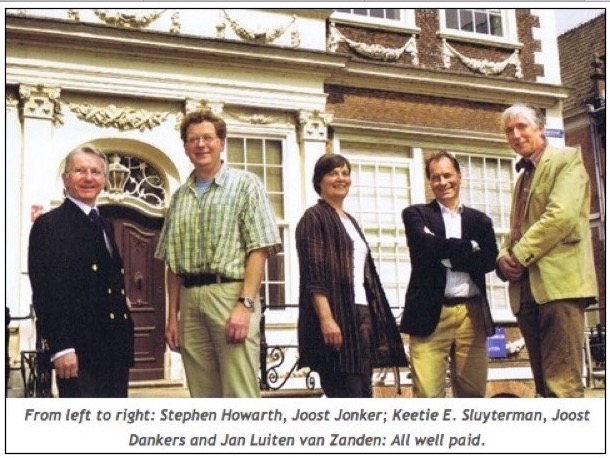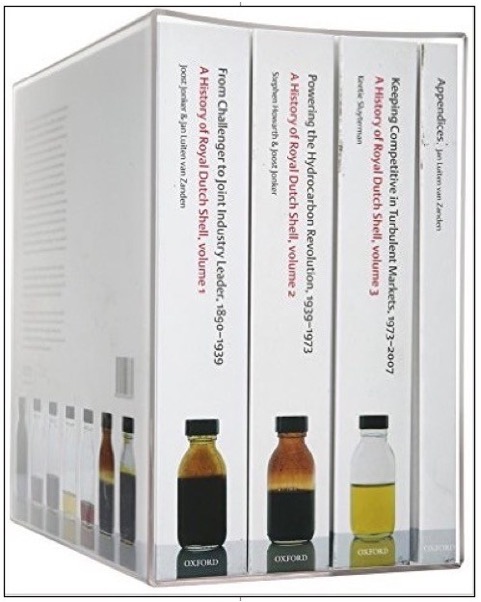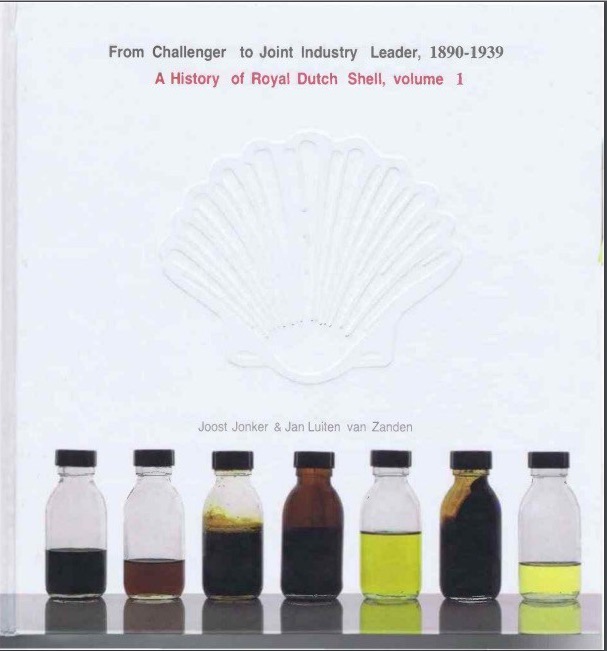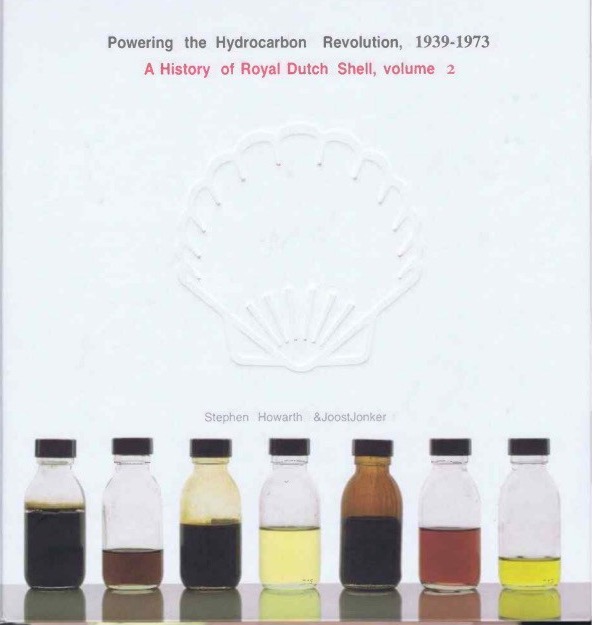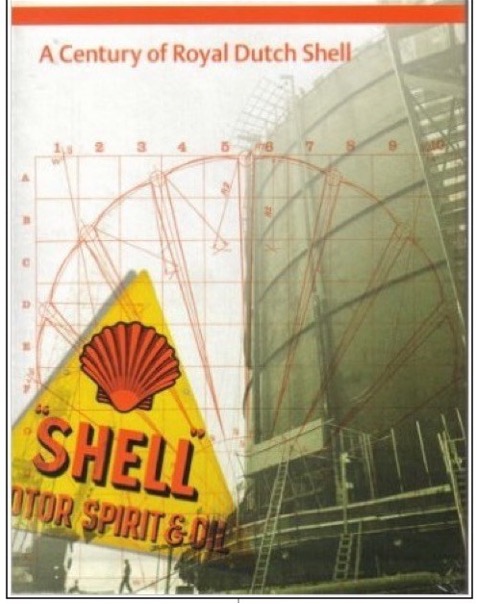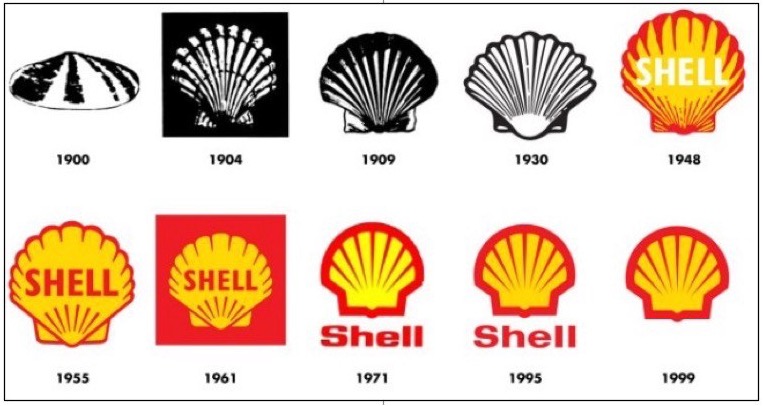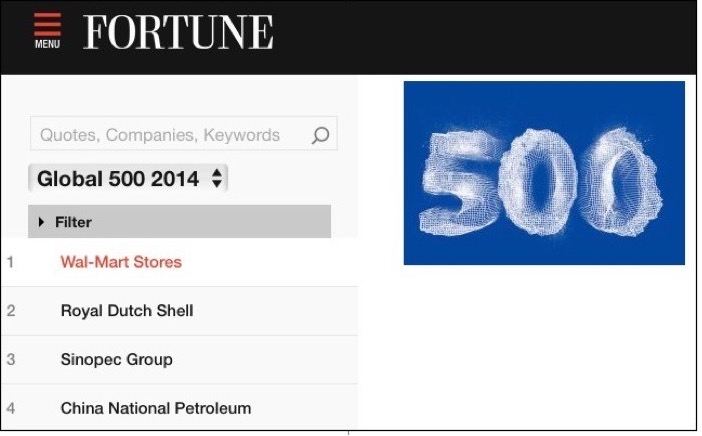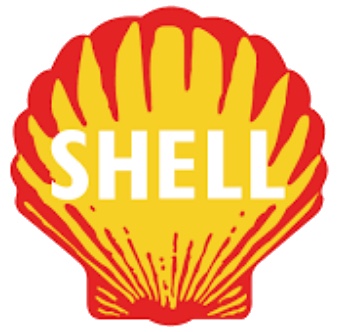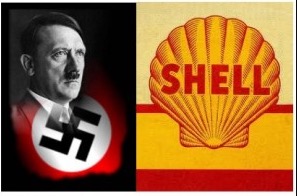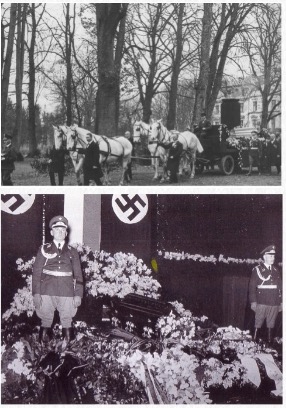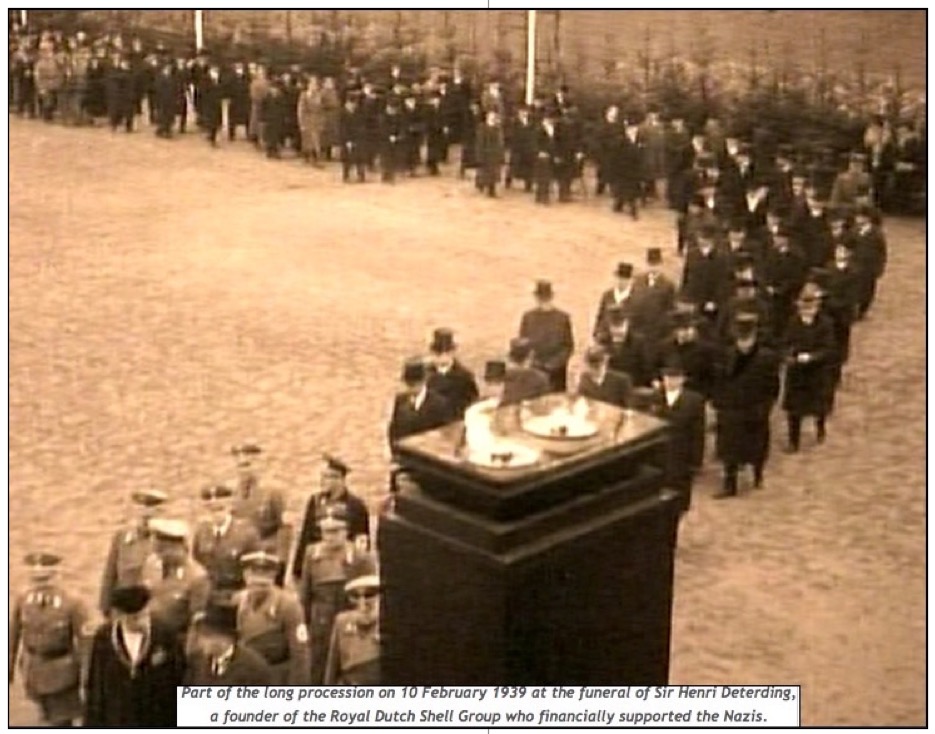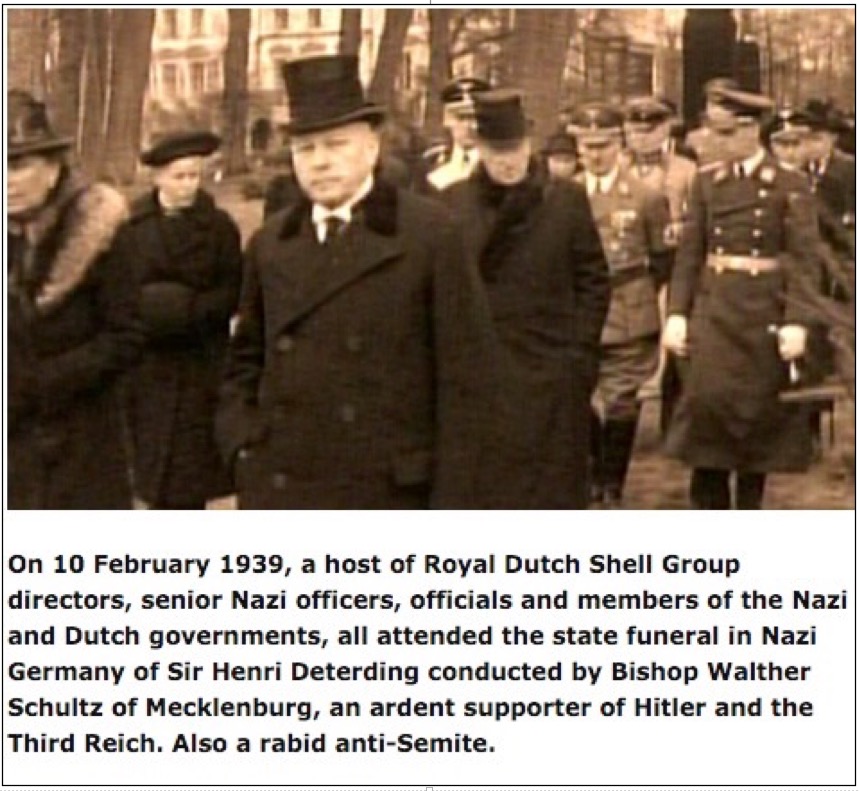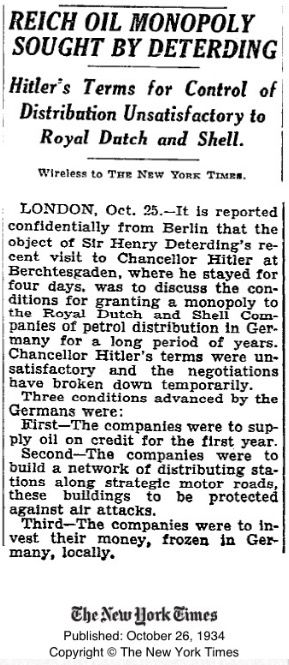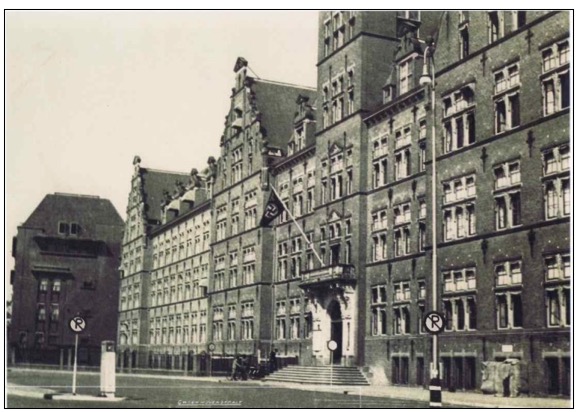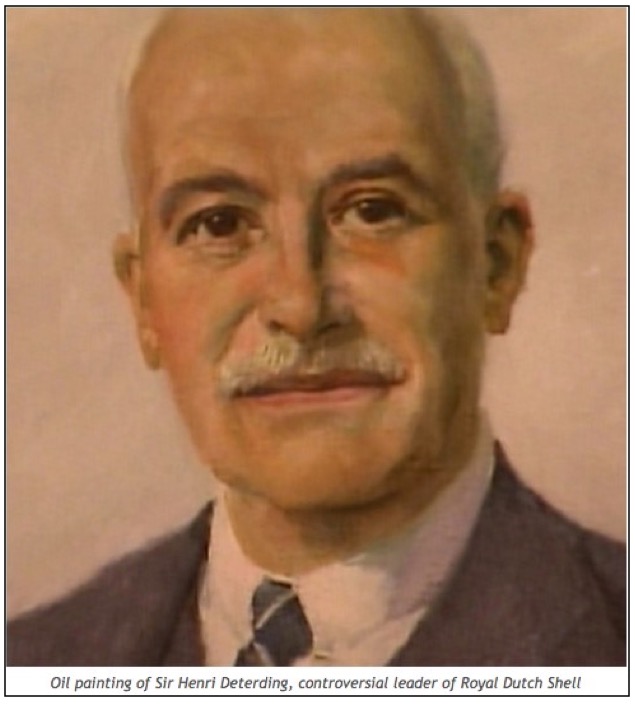By John Donovan
Shell commissioned a group of eminent “independent” historians (above) mostly Dutch, to author a history of Royal Dutch Shell to mark the Group’s centenary in 2007. The introduction in Volume 1 pledged independent research and “a proper and even-handed assessment of Deterding.” Something went amiss because the “history,” as published in regard to his dealings with Hitler, is simply untrue.
On 24 May 2015, a light-hearted story in the Prufrock column of The Sunday Times posed the question: “ARE corporate histories the new harbingers of doom?” It cited the release of corporate histories of two multinational banks that proved embarrassing to the banks due to unforeseen developments.
The piece went on to report that the historian David Kynaston has embarked on writing a history of the Bank of England. It ends with a wry warning to the bank governor, Mark Carney, asking: “What could possibly go wrong…”
Similar pre-publication jitters occurred internally at the oil company Shell prior to the publication in 2007 of a four-volume history of the Royal Dutch Shell Group.
The concern was about the prospect of me, a humble but prolific author of articles about Shell, scrutinizing the content.
Company officials were frightened because they know that I carry out painstaking research and am not afraid to publish the facts that emerge, whether positive or negative about Shell. I can safely claim to be the world’s leading online source of information about the oil and gas giant.
For over a decade, I have unearthed a vast amount of information about Shell that has been published by Reuters, Dow Jones Newswires, The Wall Street Journal, the Financial Times and a host of other national and International news providers.
Shell is aware, as I am, that it has more skeletons rattling around in its corporate cupboard than any other company in existence: hence the justified corporate jitters.
I know about the anxiety because I have in my possession authentic copies of Shell internal emails circulated in 2007 expressing concern over my likely reaction to the publication of “A History of Royal Dutch Shell.” Shell had no idea that I would ever become aware of the emails.
Concern was also expressed in Shell internal emails over my editing of Wikipedia articles about the company. (More on that subject later.)
It was from Shell internal emails that I found out about the then pending publication of the Shell history extravaganza (center). A great work spoilt by spin on its most sensitive subject: Shell’s Nazi history.
Some of the supporting evidence quoted in this book comes from the first two volumes:
A History of Royal Dutch Shell: Volume 1:
“From Challenger to Joint Industry Leader 1890-1939” by Joost Jonker & Luiten van Zanden.
(Referred to hereafter as RDSH V1)
A History of Royal Dutch Shell: Volume 2:
Powering the Hydrocarbon Revolution, 1939-1973: By Stephen Howarth & Joost Jonker.
(Referred to hereafter as RDSH V2)
IMPARTIALITY OF SHELL’S HISTORIANS
The Research Institute for History and Culture supervised the work of eminent historians hired by Shell, all associated with Utrecht University, who authored “A History of Royal Dutch Shell.” The fact that certain unethical senior Royal Dutch Shell executives (named later) had an editorial role in the entire work is however at odds with the claimed independence and impartiality of the historians.
Being in the pay and editorial control of Shell, relevant members of the team of four historians could be forgiven for any bias in favor of their generous client in relation to Shell’s toxic Nazi history.
One of the historians, Stephen Howarth, has had a relationship with Shell on other Shell history projects. (See page 143 from RDHS V4 Appendices for more information.) He was criticized in a book published in 2005 – SHELL SHOCK: THE SECRETS AND SPIN OF AN OIL GIANT – for allegedly misrepresenting the facts in a 1997 history of Shell by Stephen Howarth in relation to Deterding’s Nazism. The authors reached a damning conclusion about his impartiality, describing on page 116 his findings on the subject as “a long way from the truth…” Shell must have liked his work (the positive spin for Shell as opposed to Deterding) because they hired Howarth again for the 2007 four volume set.
Shell is a valued major financial benefactor and supporter of Utrecht University. It is reasonable to conclude that the University and those associated with it, including the hired historians, would not wish to upset such an important benefactor/partner and client. Under the circumstances, there is a question mark over the claimed impartiality and independence of Shell’s paid historians.
IMPARTIALITY OF THE AUTHOR OF THIS BOOK
It would also be unrealistic for me to claim to be independent and impartial bearing in mind past news headlines about me and my long term connection with Shell.
For many years, I have provided an Internet-based watchdog focus on the activities of Shell, well known to the news media. Its purpose is to encourage Shell senior management to abide with and enforce Shell’s claimed business principles. Not much to ask.
I have obtained and published Shell internal documents from a variety of sources, including from insiders and from formal applications to Shell under UK Data Protection Laws. They provide irrefutable evidence that Shell‘s deeds do not match the pledges of its business principles.
The pending publication of this book was mentioned during 2015 media coverage of a related news story.
It was about my campaign to change the name of a huge new ship hired by Shell, despite knowing prior to its launch that it was to be named after a convicted Nazi war criminal. Namely, Pieter Schelte, a former officer in the murderous Waffen SS.
Shell made a horrendous misjudgment about media, union, government and public reaction, by once again linking its name and brand with the Nazis: Details in the next Chapter.
Shell may regret allowing its paid historians unrestricted access to company archives. The evidence they unearthed, combined with external evidence I have assembled from hundreds of verifiable sources, has exposed a dark and shameful corporate history.
It shows that Sir Henri’s fellow Dutch directors shared some of the blame for the Groups financial backing, appeasement, and collaboration with Nazi Germany.
The true history stains the Shell brand for all time, not just the reputation of Sir Henri Deterding – the biased verdict given in a filmed interview with one of Shell’s paid historians, Dr. Joost Jonker.
His agreement with the film presenters conclusion on that point was featured on DVD Disc 1: “A Century of Royal Dutch Shell: From Challenger to Joint Industry Leader up to 1939.” (A set of three DVD’s included in the four-volume work.)
In the final chapter, there is extensive further information about my extraordinary relationship with Royal Dutch Shell.
ROYAL DUTCH SHELL IN THE 1930‘s
In 1933, after Hitler came to power, the Royal Dutch Shell Group publicly boasted about its contribution to the finances of Germany.
The Group, under the control of Dutch directors, was the largest employer in the German oil industry. It boosted the Nazi economy at a crucial period for the Hitler regime with extensive business activities involving over a billion Reichsmarks.
The Groups Dutch Director General, Sir Henri Deterding, with the full knowledge of senior management colleagues, made huge donations to a Nazi organization. As a result, the Third Reich was able to increase military spending.
Management from Shell’s German subsidiary Rhenania-Ossag Mineralölwerke AG, under the control of Dutch directors of Royal Dutch Shell, was involved in military planning for WW2. Such was the importance of Shell and its oil to Hitler.
Several Dutch Directors of the Group were Nazi appeasers and at least, two were pro-fascists. Shortly before WW2, they surrendered to Nazi demands to force out Jewish directors and employees from Rhenania-Ossag. Jewish directors were replaced with Nazis.
The money that the Group and its Dutch leader pumped into Nazi Germany was generated on Shell forecourts around the world. The funds arguably saved the fledgling Nazi party from financial collapse. Evidence is provided within.
THE SHELL LOGO
The history of the Shell logo goes back over a hundred years. It first appeared in 1901 and is one of the ten oldest company logos in existence, displayed prominently on tens of thousands of Shell-branded gasoline forecourts around the globe.
Like the version of the Swastika created by the Nazi Party in Germany, it is one of the world’s most instantly recognizable symbols and is inseparable from the brand name – Shell – by which the multinational Group is most widely known.
Some people might be aghast at the notion of comparing the iconic Shell logo with the infamous Nazi symbol, but there was once a strong connection.
ROYAL DUTCH SHELL IN CURRENT TIMES
The Royal Dutch Shell “Group” consists of hundreds of operating companies around the world. The “Group” does not, however, exist as a legal entity. It became an accepted collective description.
Since 2005, following a merger between the Anglo-Dutch arms of the “Group” arising from a scandal, a parent company was formed called Royal Dutch Shell Plc. A Dutch company incorporated in the UK.
It has around 90,000 employees and in 2013, measured by revenue, was ranked at the top of the Fortune 500 list as the largest company in the world.
In the 2014 list, it ranked No. 2, with Wal-Mart Stores holding the top position.
In April 2015, Shell announced plans to buy the BG Group, another global energy company, for $70 billion. In January 2016 shareholders of Royal Dutch Shell Plc and BG Group Plc approved the controversial acquisition. The completion in February 2016 may help restore Shell to No. 1 in the Fortune 500 rankings.
In September 2015, following a series of humiliating mishaps, wasting over $10 billion and in the wake of an extraordinary campaign by Greenpeace, Shell announced that it was abandoning plans to drill in the Arctic.
On the surface, Royal Dutch Shell appears to be a respectable multinational operating within a set of self-imposed business principles. The reality is rather different.
Once again putting profit before principle, Shell is currently strengthening its close association with another dangerous rogue state. I refer to Russia, under the aggressive and murderous Putin regime, which like the Nazis, has territorial ambitions, and whose assassins left a radioactive trail in London.
Copyright Notice: All rights, including copyright and compilation in the content of shellnazihistory.com web pages authored by John Donovan are owned or controlled for these purposes by him. In accessing the said web pages, you agree that you may only download the content for your own personal non-commercial use. Except where expressly stated otherwise, you are not permitted to copy, broadcast, download, store (in any medium), transmit, show or play in public, adapt or change in any way the content of these web pages for any other purpose whatsoever without the prior written permission of John Donovan via the email address: john@shellnews.net
shellplc.website and its sister non-profit websites royaldutchshellplc.com, royaldutchshellgroup.com, shellenergy.website, shellnazihistory.com, royaldutchshell.website, johndonovan.website, shellnews.net and shell2004.com are owned by John Donovan. There is also a Wikipedia feature.